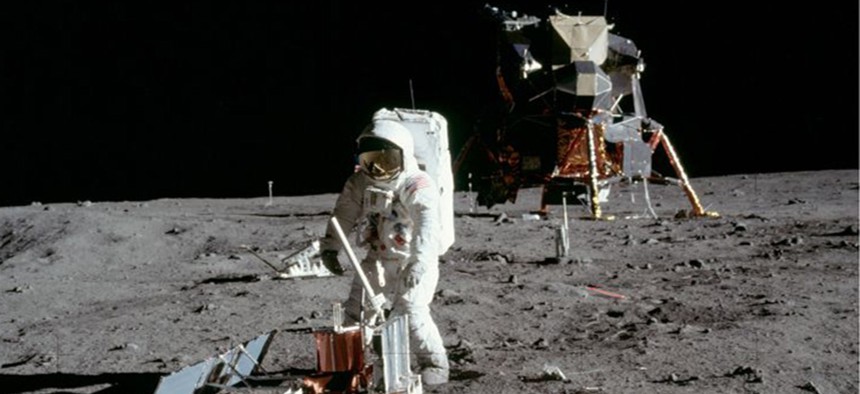
This man was not there for pleasure, but for business. NASA file photo
The Federal Government is Getting Ready For the Commercialization of the Moon
How will the government regulate lunar development?
Let’s say you want to build a hotel on the moon. Would you buy the land? Claim it?
With private companies racing to make space access cheaper, this question is becoming far less of a joke and far more of a real concern. And it’s led the US Federal Aviation Administration to start laying plans to license US businesses to operate on the moon, Reuters reports.
Bigelow Airspace, a company founded by a real estate entrepreneur to build inflatable habitats for humans in space—whether orbiting the earth or ensconced on the surface of the moon—helped focus the agency’s attention to the issue. Human activities on the moon are governed, legally speaking, by a United Nations treaty written in 1967 that requires nations to license any space activities by people or businesses in its jurisdiction, but prohibits any national claims on celestial territory.

A rendering of Bigelow Aerospace’s inflatable orbital habitat. (Bigelow Aerospace)
The US government has decided that the FAA will take charge of licensing lunar activities, using the same system companies go through to have rocket launches approved. Eventually, the process could pave the way for companies like Bigelow to gain exclusive rights to operate their businesses on a chunk of lunar territory without interference from others. But no such license has been granted yet. As one FAA official told Reuters:
“We’re talking about a payload review that would potentially be part of a future launch license request. But it [the Bigelow inquiry] served a purpose of documenting a serious proposal for a U.S. company to engage in this activity that has high-level policy implications.”
Many of those high-level policy implications are international: There are no real rules for commercial enterprises on the moon, or governing property rights over resources like minerals. In the 1970s, the UN attempted to take on these issues in a Moon Treaty, but it only attracted the support of nine countries. As more and more companies and countries go, or return, to space, international legal frameworks will need to be updated to avoid conflicting claims—and plain old conflicts—between different businesses and national governments.
In the meantime, the final frontier is just that—a place with few hard-and-fast rules governing the behavior of commercial actors, if they can only get there.







